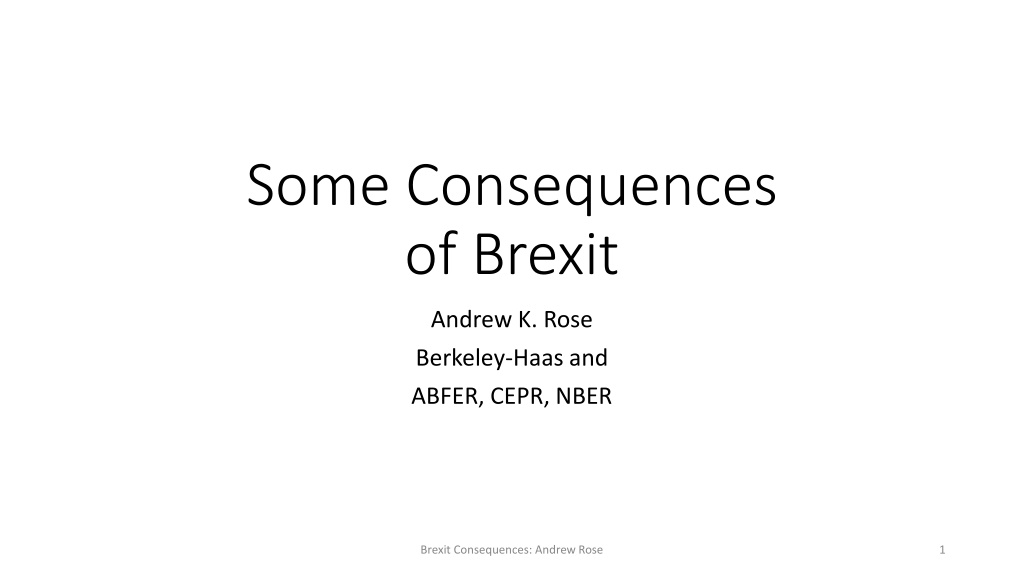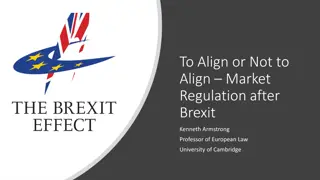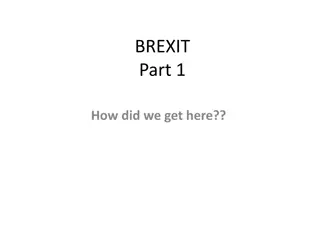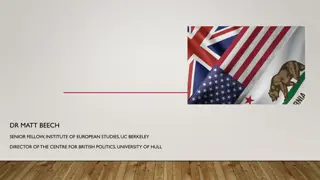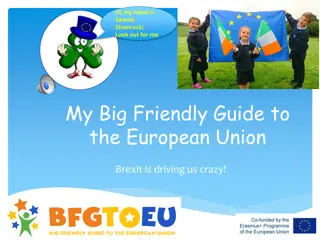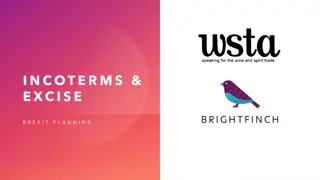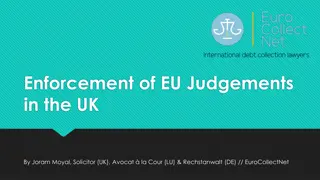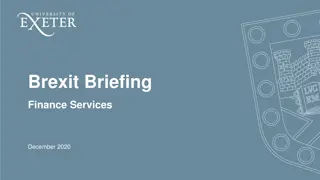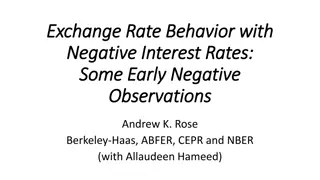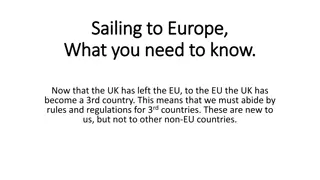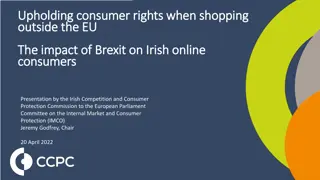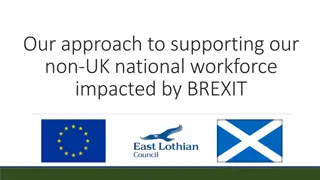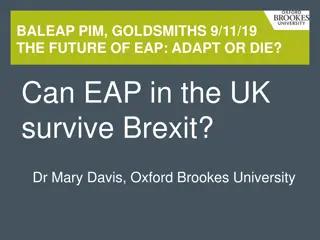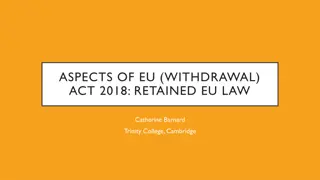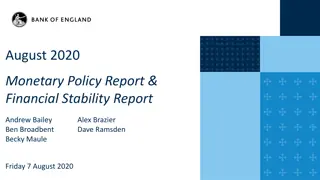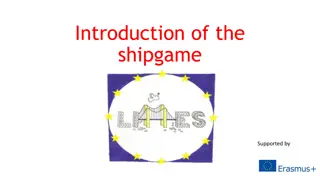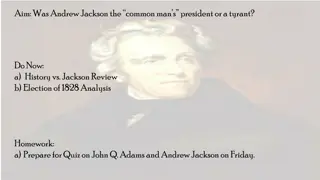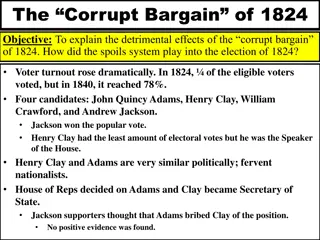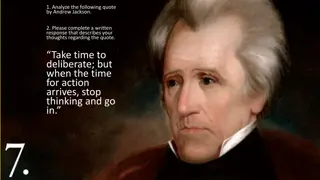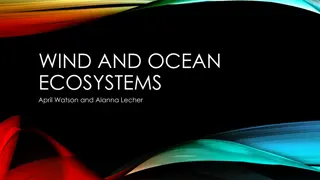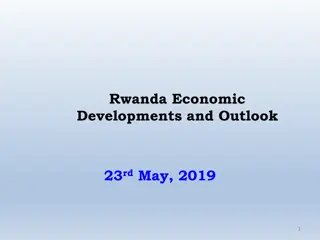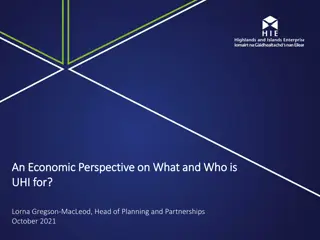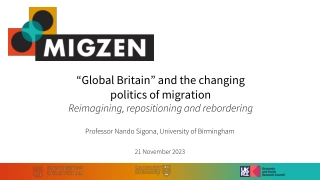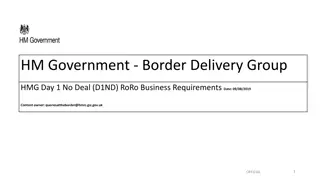Consequences of Brexit: Insights by Andrew K. Rose - An Overview
Delve into the unexpected aftermath of Brexit as analyzed by Andrew K. Rose, focusing on political and economic dimensions. The consequences of this historical event highlight the unforeseen outcomes, lack of prior consideration, and the immense uncertainty post the referendum. Explore the political background, ongoing Tory skepticism towards the EU, and the events leading up to the UK's decision to leave the European Union.
Download Presentation

Please find below an Image/Link to download the presentation.
The content on the website is provided AS IS for your information and personal use only. It may not be sold, licensed, or shared on other websites without obtaining consent from the author. Download presentation by click this link. If you encounter any issues during the download, it is possible that the publisher has removed the file from their server.
E N D
Presentation Transcript
Some Consequences of Brexit Andrew K. Rose Berkeley-Haas and ABFER, CEPR, NBER Brexit Consequences: Andrew Rose 1
The Unthinkable Happened Serious Consequences along Many Dimensions Focus here on: Political Economic Brexit Consequences: Andrew Rose 2
Brexit Result Essentially Unexpected Polls Close throughout Campaign But Betting Markets not! Brexit Consequences: Andrew Rose 3
Polls Close Throughout Brexit Consequences: Andrew Rose 4
Not Betting Odds: June 23 (late) had Remain at 76.1%! Brexit Consequences: Andrew Rose 5
Consequence of Surprise/Wording Since Brexit (mostly) a surprise, consequences not carefully considered ex ante Also, alternative to remain unclear, so massive uncertainty upon Brexit Referendum wording: Should the United Kingdom remain a member of the European Union or leave the European Union? Brexit Consequences: Andrew Rose 6
Political Background, 1 Ongoing Tory skepticism about EU (dating back to PM Thatcher) Earlier too: EEC entry refused 1963, 1967 EEC 1973 entry (Heath), 1975 referendum (Wilson) Thatcher wins rebate, 1985 Thatcher falls over Europe (and poll tax), 1990 ERM Crisis 1992 Rise of UKIP 2011-13 Jan 2013: PM Cameron promises referendum, conditional on re- election May 2015: Tories re-elected in surprise Brexit Consequences: Andrew Rose 7
Political Background, 2 Winter 2016-17: UK renegotiates conditions of UK s EU membership Recognition that EU has multiple currencies; Eurozone cannot damage EU (can appeal EMU decisions); UK sets regulatory rules for financial services Feb 2017: PM Cameron sets June 23 as referendum date Sources of skepticism: 1. Long-standing, continuing UK nationalism 2. Ongoing Euro crisis, Grexit, high youth unemployment 3. European migration crisis Some high-profile MPs campaign to leave Michael Gove, Home Secretary; Boris Johnson, London mayor Brexit Consequences: Andrew Rose 8
British Political Consequences PM steps down; replaced by Theresa May (remainer) Labour troubles: Jeremy Corbyn weak, UK lacks effective opposition Possible exit of (pro-EU) Scotland Nicola Sturgeon demands 2nd Sottish Referendum (within 18m), March 2017 Big problems with Northern Ireland, Open border with Ireland part of Good Friday accord Also problems for EU Post-Brexit Germans look too large; EU becomes more inward/socialist Also problems for RoW (first signs of nationalism in 2016) UK less useful for US outside EU Brexit Consequences: Andrew Rose 9
Political Consequences: Sovereignty Supremacy of EU law violates sovereignty of parliament But EU laws not imposed solely by Brussels bureaucracy! EC proposes legislation Adopted by Council of Ministers (includes British PM) and (elected) European parliament Also: British parliament can withdraw from EU All international obligations imply sovereignty loss (e.g., NATO) But gain influence As EU member, UK represented twice at international summits But limited influence within EU Brexit Consequences: Andrew Rose 10
Rise of Nationalism Benefits of Integration ignored EU as quintessentially a peace-generating institution First exit from EU: a dangerous precedent Brexit Consequences: Andrew Rose 11
Rise of Populism Anti expertise Destruction of existing institutions instead of reform Propensity for revolt intrinsically dangerous Interaction with user-chosen media Referenda rather than representative democracy Brexit Consequences: Andrew Rose 12
Important Economic Consequences of Brexit 1. Trade 2. FDI (especially financial) 3. Migration 4. Regulation 5. Fiscal (EU budget) Brexit Consequences: Andrew Rose 13
Most Obvious Economic Consequence: British Trade Critical Question: How Important is the EU to the UK? And how important is the UK to the EU? Brexit Consequences: Andrew Rose 14
Statistical Overview of British Trade The UK is a VERY open economy! Export/GDP = 28% #11 global exporter Comparison: US 13%; Germany 46% Import/GDP = 29% #6 global importer Current Account Deficit $124bn = 4% GDP (!), persistent Brexit Consequences: Andrew Rose 15
Brief Statistical Overview of British Trade The EU matters for British trade! Around 50% British imports from EU Ditto British exports: half to EU Only 10% EU exports go to UK: asymmetry Manufactured; fuel; chemicals; Supply chains with EU deep, growing: likely disrupted Services are big, growing fast, and the future Regulatory harmonization with EU likely more important than tariffs Brexit Consequences: Andrew Rose 16
UK Needs New Trade Deal with EU Brexit means UK needs a new trade deal with EU (27) Negotiations painstaking, politically fraught Requires agreement with 27 other EU countries PLUS European parliament EU likely to punish UK, deter exiters Most trade barriers are NTBs, difficult to remove (because protected by special- interests. Any FTA with EU likely to take long time Article 50 allows for two years(!) Can be extended with unanimity Designed to give most power to EU, not exiter UK had literally no relevant civil servants before Brexit! Free-trade agreements do not come free, do not cover all trade, takes ages to agree Started by liberals, finished by protectionists Canadian FTA negotiations began in 2007 and they re Canadian! Brexit Consequences: Andrew Rose 17
UK also Needs Deal with Rest of the World As EU member, UK has not been involved with trade negotiations for two generations; handled by EU Brexit means UK needs a new trade deal with RoW Much easier to undertake inside EU, using its apparatus EU has 53 FTAs with third countries Korea, Mexico ... and future ones with US, China, India All those have to be handled too! Probably must wait until EU/UK situation clarified Even creating UK s own tariff/quite subsidy rules must be approved by WTO 163 other WTO members Slow moving: think of Doha Brexit Consequences: Andrew Rose 18
Why does This Matter? Open Economies are Richer Economies LSE Estimates: Static effects of Brexit: small Optimistic (Norway): 1.3% drop in income Realistic: 2.6% Long run because of productivity effects: 6.3-9.5% of GDP Other studies give similar estimates: typically negative, less than 5% GDP Considerable uncertainty because unclear what Brexit entails Brexit Consequences: Andrew Rose 19
Things to Remember UK has always been extraordinarily open to trade Ever since industrial revolution, has championed free trade in goods, services and capital Historical role of Royal Navy Britain is already more open than most of the world So it has fewer concessions to give UK also historically open to foreign ideas and people Brexit Consequences: Andrew Rose 20
So Status Quo Superior to Any Exit Can UK just technically exit but retain access to single market? Access to single market comes with access to all of single market (labor), and paying dues (Norway, Switzerland), without voice in creating laws Inconsistent with promises of Brexiters and PM May Hence likely to exit unless fudge can be found Trade outside single market painful and expensive Ex: checking for rules of origin in exports Singapore alternative free trade unilaterally But some special interests lose (agriculture) No bargaining chips to induce others to liberalize Brexit Consequences: Andrew Rose 21
Back to Earth Consensus in Literature: FTAs aren t that important, because many trade barriers already eliminated Harberger triangles are small Freer Trade improves welfare, but not that much Trade linkages are difficult for a firm/country to establish Created slowly, but usually wither slowly (absent some political shock) Conclusion: likely a long period of stagnation/gradual closing Brexit Consequences: Andrew Rose 22
Options for Hard Exit 1. Imitate Norway: join EFTA and EEA Pay for access to single market, requires labor mobility; hence unlikely 2. Imitate Switzerland (EFTA, not EEA) Ditto 3. Imitate Turkey: FTA/customs union with EU 4. Standard WTO relationship Doesn t handle many tariffs (cars), NTBs, most services (financial!) 5. Special British relationship with EU Seems most likely, but difficult to negotiate Brexit Consequences: Andrew Rose 23
FDI/Financial Services Britain has been a popular destination for FDI because it serves as stable export platform for EU (Japan, Korea, China, US) Notably in autos, aero-space ... especially financial services City of London very important to British economy >2m employees, 12% GDP and taxes, massive trade surplus Rivals: Paris, Frankfurt, Dublin, Amsterdam ... What will hard Brexit consist in? Will UK lose passporting rights which allow UK banks/firms to trade across EU? Again, can t sensibly discuss effects without taking a stand here Brexit Consequences: Andrew Rose 24
Migration UK an attractive destination for economic migrants Free flow of people part of Single Market But UK not part of Schengen (passport-free) zone Hence avoided most of refugee crisis Note: consensus that EU migrants are net fiscal contributors! Long-standing Tory issue: Cameron vowed to reduce net migration below 100k p/a Never succeeded; currently over 300k But antipathy a major reason for Brexit vote No easy solution 8 million foreigners living in UK (many non-EU) 2 million Brits in EU (more outside EU) Brexit Consequences: Andrew Rose 25
Regulation Most EU regulations collapse (28) national standards into single EU Reduces red tape, benefits business But geared towards European, not British interests OECD: UK already among least regulated countries in Europe Brexit Consequences: Andrew Rose 26
Light Hand of British Regulators Brexit Consequences: Andrew Rose 27
Narrow but Prominent Issue: Fiscal Payments 1. Lump-Sum Exit bill of 60 billion (!) 2. Forgoes ongoing payments 340 p/a per household But net payments are only one-third of this Estimated benefits: 3,000 p/a per household Brexit Consequences: Andrew Rose 28
All Adds up to ... Huge Uncertainty Hard to resolve in two years! Especially because: Status of foreigners in UK Status of British residents abroad Incentives of current EU members to discourage further secession Uncertainty deters investment a lot in practice Hence support of most British industry for remaining Brexit Consequences: Andrew Rose 29
Economic Policy Uncertainty is Quantifiable Brexit Consequences: Andrew Rose 30
Going Forward Theresa May has opted for a hard Brexit (Jan 17) Parliamentary issues mostly resolved: Brexit legislation has passed both Commons, Lords, March 17 So far, little sign of economic downturn GDP growth moderate, unemployment stable None at all in stock market Brexit Consequences: Andrew Rose 31
British Stock Market Brexit Consequences: Andrew Rose 32
Exception: Sharp, Persistent Depreciation Brexit Consequences: Andrew Rose 33
Summary Brexit inflicted a number of self-inflicted wounds: 1. End of political career of PM Cameron, wounding of Corbyn 2. Possible end of UK (Scotland, Ireland) 3. Illusory gains in sovereignty 4. Losses to international trade, FDI, pound, material standard of living 5. Possible demise of City of London 6. Little gain in regulatory freedom, fiscal freedom 7. Increase in uncertainty, especially about migration 8. Increase in populism, nationalism, tribalism Brexit Consequences: Andrew Rose 34
